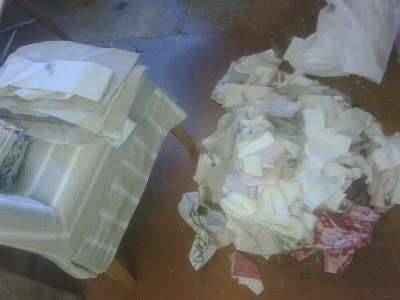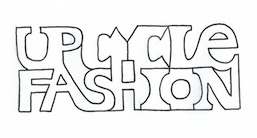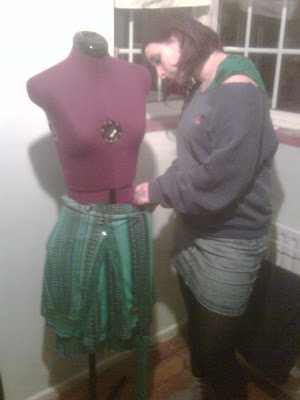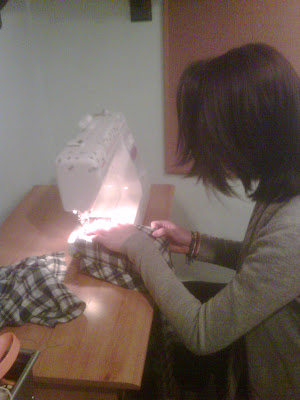Following the UAL Swapshop in March, I spoke with a journalist for the Guardian who was researching an article about organising 'swishing' and clothes swapping parties in your place of work.
The link went live recently, click here to read the article, although the comments left by guardian readers below were not as enthusiastic as I am about clothes swapping with their colleagues. I guess the key to swapping clothes is to find the community who best fits your style!
Saturday, April 24, 2010
EJF Pop Up Shop at Carnaby Street
Today I visited the Environmental Justice Foundation pop up shop at Carnaby Street (opposite end to Liberty). I love pop up shops and think they are a great way to get the message across to lots of shoppers about the issues surrounding the clothing we buy and making us aware of the values we need to consider when buying garments.
Raising awareness of their brilliant campaigns, check out their website here
The shop is selling great clothing brands such as:
Monkee Jeans, From Somewhere, Junky Styling, Goodone and Pants to Poverty, plus the collection of EJF designer organic and fair trade t-shirts.

The EJF pop up shop will also be the venue for the next EFF Social, on Thursday 29th April.
Sunday, April 18, 2010
Fabric Scraps: Destination Unknown
I work at a lovely fabric shop, Ian Mankin selling fabric woven in the UK for interiors (but I also love using some of them for fashion too!)
We always have swatches and remnants left over from out of stock fabrics, one off designs that they decided not to continue an d small cut offs from when we cut samples of fabric.
d small cut offs from when we cut samples of fabric.
Yesterday I had a sort out through 2 large bags of remnants that had been kept although we could not sell them in the shop. This type of fabric waste must be produced by many other fabric shops, but what do they do with it?
what do they do with it?
I am happy to know that at the fabric shop we throw no fabric 'away', but we have lots of small scraps in store.
If anyone reading this vounteers for community sewing projects, runs a sewing class or works in a school with a textile department who are always on the look out for scraps of fabric to practice on through stitching, patchworking or quilting, etc. these small swatches are perfect and are lovely fabrics to work with.
Send me an email if you are interested as we have lots in store and are happy to see them sent to a happy home and used!
We always have swatches and remnants left over from out of stock fabrics, one off designs that they decided not to continue an
 d small cut offs from when we cut samples of fabric.
d small cut offs from when we cut samples of fabric.Yesterday I had a sort out through 2 large bags of remnants that had been kept although we could not sell them in the shop. This type of fabric waste must be produced by many other fabric shops, but
 what do they do with it?
what do they do with it?I am happy to know that at the fabric shop we throw no fabric 'away', but we have lots of small scraps in store.
If anyone reading this vounteers for community sewing projects, runs a sewing class or works in a school with a textile department who are always on the look out for scraps of fabric to practice on through stitching, patchworking or quilting, etc. these small swatches are perfect and are lovely fabrics to work with.
Send me an email if you are interested as we have lots in store and are happy to see them sent to a happy home and used!

Friday, April 16, 2010
Sunday, April 11, 2010
Food Workshop @ Hackney City Farm
 At a Food Workshop with fellow Hackney City Farm Green Ambassadors this afternoon, three of the main points the group focused on were also strongly linked to those that continuously appear within the debates and discussions around our sustainable fashion industry. With particular focus on these issues it was interesting to see that people pioneering and promoting sustainable lifestyles in whatever industry face recurring themes.
At a Food Workshop with fellow Hackney City Farm Green Ambassadors this afternoon, three of the main points the group focused on were also strongly linked to those that continuously appear within the debates and discussions around our sustainable fashion industry. With particular focus on these issues it was interesting to see that people pioneering and promoting sustainable lifestyles in whatever industry face recurring themes.
1) Value: Realising and appreciating the real cost.
FOOD - this was of particular importance in terms of understanding and appreciating the nutritional value of fresh produce, and also the effects our food can have on our environment, directly on our bodies and health and the health of those that farm it. The value of cooking a meal and having food readily available is something that many people take for granted when they have no connection to the farming, harvesting and distribution processes.
FASHION - understanding the value of clothing also can rely on the connections we have to our clothing and wether or not we feel connected to the process of manufacture. Appreciating the value of clothes often ensures a long use phase as they are less likely to be seen as disposable if regarded as a valued item.
VALUE= It is only when people see something as important or understand the value of something that they will change lifestyles. If you want to do something, if you regard it as important, you will incorporate it into your lifestyle long term.
2) Availability - Working only with what is available at certain times of the year.
FOOD - Growing, buying and cooking only seasonal produce is a great sustainable aim, and along the way promotes local produce, a respect for the environment and a necessary education of the way our food grows. Learning about what is in season shouldn't be seen as limiting, but as a natural approach to cooking and developing different recipies as the seasons come and go.
FASHION - One of the main elements within upcycling, is working with what is available. Although this cannot be controlled in the same way as the seasonal growing of food, the vast volume of unwanted and slightly damaged clothing sourced for upcycled garments inspires the design, working with what is available at certain times...letting the materials and garments available inspire what you create is one of the most exciting and unique elements of upcycling...
"The Artists, Craftsmen and Designers now suffer from the tyranny of absolute choice. When everything becomes possible, when all the limitations are gone, design and art can easily become a never ending search for novelty, until newness becomes the only measure."#
Victor Papanek, Design for the Real World. p.42
AVAILABILITY= This sould not be seen as limiting, but acknowledged as an element out of our control, and used to inspire creativity.
3 - Community and Learning - Involvement
FOOD - One of the great memories many people associate with food is the social environment in which it is eaten and shared. Cooking with family or friends, cooking for family and friends and eating with a group of people is something that should be harnessed to promote sustainable attitudes to food. Food communities, Growing Communitues, shared food boxes and community allotments are ways of bringing people together through the growing, cooking and eating of food, and through sharing these experiences we can learn a great deal.
FASHION - Feeling connected to and involved with the process of garment creation and learning through working in a group is something that also applies to many fashion initiatves. Stitch and Bitch, Garment Workshops and Clothes Swap parties bring people together to create or exchange clothing. When the process of learning, sharing and making is combined with a social event it is a great way for people to feel connected to the garments involved, which also linked to the previously mentioned topic of value.
COMMUNITY= Being involved in a community initiative promotes learning and action that when undertaken as part of a group makes you feel involved, responsible and more empowered as you help others to achieve a goal.
Subscribe to:
Posts (Atom)




 Family, Clothes, Sewing Machine...Good Times!
Family, Clothes, Sewing Machine...Good Times!





